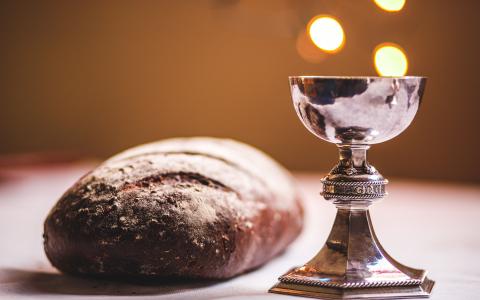
Welcoming Children to the Lord's Supper Toolkit
From Thrive
Sunrise Community Church, Austin, TX
Children at the Table, Our Congregation’s Journey
Written by Mark Hilbelink, pastor
February 2015
Sunrise’s journey toward children at the Lord’s Supper took some interesting and unexpected twists. Many years before the CRC decided to allow children at the Lord’s Supper, we did it anyway. Sunrise is that sort of place – we don’t usually try to break the rules, but we’re so far on the periphery of our denominational family that we often bend them about as far as they can be bent in the name of contextualizing a very northern-thinking Christian denominational expression into a Texan mission field. Even amongst our sister churches here in Texas, we’re seen as an outlier – one that often reaches people most churches don’t reach but one who also pays the price with complicated, systemic issues. And so, long before I arrived at Sunrise, we welcomed children to the Lord’s Supper illegally. Then, suddenly, our leadership decided to rescind the practice about five years before the CRC allowed it. What our council and pastor at the time realized was that the celebration had lost its contemplative spirit. People – especially kids – weren’t treating the Lord’s Supper with the respect and dignity our leadership thought it deserved. So suddenly we were legal again, but it left some folks – especially some parents – feeling disappointed. I arrived at Sunrise in late 2006, having come from a different denomination that allowed children at the Lord’s Supper. The conversation was already in pretty full swing in the CRC and the decision to allow children looked inevitable soon after I got there, so our council reopened discussion on the topic.
This second go-round wasn’t much of a journey, really. We talked it over for a few months and sensed that allowing children to the Lord’s Supper was something we felt compelled to do. As part of a quickly changing ministry environment after my arrival, we had already set up a new once-a-month intergenerational Sunday on the first Sunday of every month, so it seemed to make sense to allow children to participate if we were going to be purposely intergenerational in all other aspects of worship on that day. Some on our council still felt like there was a risk that children – especially from new families rapidly joining the church – would not fully comprehend the meaning of the sacraments (we also did baptisms on our “Altogether” intergenerational Sundays). Our compromise was that our elders would take turns visiting our kid’s ministry on the last Sunday of each month to talk to the kids about what the sacraments meant. This also fueled their anticipation of the following Sunday. As part of serving children, our communion servers all got some “idea phrases” that they could say to children as they came up to the front to be served with their parents. Instead of our typical “the body and blood of Christ was broken for you, _______”, they used language that mirrored the language our elders were using during their visits – language of God’s love, language of unity, language of Jesus’ death and resurrection for them.
As an integral part of our Altogether Sundays, the Lord’s Supper is now something we all enjoy together. Our church has always been a place where interesting oddball folk join together at the table, but as we’ve fused our intergenerational once-a-month Sundays with the tangibility of the sacraments on that day, we’ve reaped a rich harvest of reflection, unity and hope.
I think, in general, forced intergenerational practice is good for all sides. For our parents, who get to leave their kids in our kids ministry for the entire length of the worship service three or four Sundays a month and for those who sit near them on Altogether Sundays, it is a reminder that the body of Christ is bigger than we usually imagine. For the kids, it is a tangible reminder of God’s love for us and the fact that the body of Christ includes a bizarre cast of characters.
Sunrise is incredibly diverse sociologically, ethically and philosophically. We benefit from strong central leadership and extremely welcoming edges. We are not a place that typically has congregation-wide arguments because being diverse (and for many people, sober) takes so much energy from us that we simply don’t have enough left over to fight. I think that’s a beautiful picture of eternity. What we have learned is that doing anything intergenerational is tough in 2015. People simply don’t want it.
We also learned to use language for the Lord’s Supper well – to impact children and adults but also to communicate why we were making the change. This was especially important to many of our church members who are former Catholics – particularly former Latino Catholics, who have a tough time when we talk nicely about things like infant baptism, Lent, Advent or children at the Lord’s Supper.
As with most things at Sunrise, we did not wait for 100% agreement. In a church as diverse as ours, nothing would ever happen that way. We thought about it, we listened for the Spirit and we stepped forward boldly. This is our approach to most difficult situations.